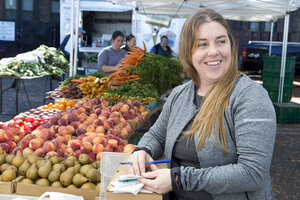The gap between what we believe and how we eat
While 60% to 70% of Americans say they are uncomfortable with factory farming, the number of vegetarians in the U.S. hovers around 5%.

Kate Stillman, a third generation farmer, works at a farmer's market selling her own locally raised meat, and produce grown by her father and brother, on October 19, 2017 in Brookline, Massachusetts.
Melanie Stetson Freeman/Staff/File
I once tried to give up hamburgers. I had taken an environmental science class in college and when presented with the simple fact that it takes more resources to raise cows than grain, I thought I could do my part by eating less red meat. This was at a time when the word vegetarian meant a problematic dinner guest.
Times have changed. “Citizen eaters” who think about the broader ramifications of what’s on their dinner plate – be it factory farming or climate change – are now driving market trends.
But a recent study shows that while 60% to 70% of Americans are uncomfortable with factory farming, the number of vegetarians in the U.S. hovers around 5%. The disconnect between desire and practice is an intriguing subject for assistant philosophy professors Victor Kumar of Boston University and Joshua May of the University of Alabama at Birmingham. They studied the psychological and social barriers to reducing meat consumption.
“I think there’s a kind of threat to your identity that people face by deciding to go vegan or vegetarian,” says Professor Kumar, director of Boston University’s Mind and Morality Lab. Someone may have family connections to Grandma’s Sunday roast, for example, or they may simply like the taste of meat and find it hard to give up.
Mr. Kumar, who describes himself as a “failed” vegetarian, says it was a casual conversation at a conference buffet table where he learned a term that honors his effort to eat less meat: reducetarian. It’s a gradual process, with built-in forgiveness. “Once you take that first step, it becomes easier,” he explains.
Reducetarianism is hardly a new concept in the United States. Thomas Jefferson saw meat simply as a flavoring for vegetables. More recently, journalist Michael Pollan, writing about an increasingly complicated food landscape, influenced millions with the words “Eat food. Not too much. Mostly plants.”
Ultimately, Professors Kumar and May underscore the importance of cooperation and community to reducing meat consumption. It’s the reasoning that says eating less meat can be both feasible and pleasurable when done together.
“Over the last few decades ... people are connecting and learning about others from a much wider range of backgrounds and experiences,” Professor Kumar says. “That broadening community is important in expanding our focus from just ourselves and our families to a lot more people.”
In other words, Grandma’s roast can still have a spot on our plate, but we can make room for new ideas, too.

